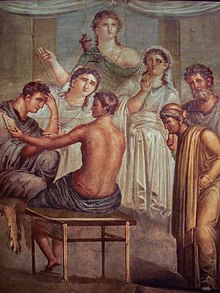Alcestis (play)
| Alcestis | |
|---|---|

|
|
| Written by | Euripides |
| Chorus | Old men |
| Characters |
Apollo Thanatos / Death Maidservant Alcestis Admetus Eumelus Heracles Pheres |
| Date premiered | 438 BCE |
| Place premiered | Athens |
| Original language | Ancient Greek |
| Genre | Tragedy |
| Setting | Pherae in Thessaly |
Alcestis (/ælˈsɛstɪs/; Greek: Ἄλκηστις, Alkēstis) is an Athenian tragedy by the ancient Greek playwright Euripides. It was first produced at the City Dionysia festival in 438 BCE. Euripides presented it as the final part of a tetralogy of unconnected plays in the competition of tragedies, for which he won second prize; this arrangement was exceptional, as the fourth part was normally a satyr play. Its ambiguous, tragicomic tone—which may be "cheerfully romantic" or "bitterly ironic"—has earned it the label of a "problem play."Alcestis is, possibly excepting the Rhesus, the oldest surviving work by Euripides, although at the time of its first performance he had been producing plays for 17 years.
Long before the start of the play, King Admetus was granted by the Fates the privilege of living past the allotted time of his death. The Fates were persuaded to allow this by the god Apollo (who got them drunk). This unusual bargain was struck after Apollo was exiled from Olympus for nine years and spent the time in the service of the Thessalian king, a man renowned for his hospitality who treated Apollo well. Apollo wishes to repay Admetus' hospitality and offers him freedom from death. The gift, however, comes with a price: Admetus must find someone to take his place when Death comes to claim him.
...
Wikipedia
